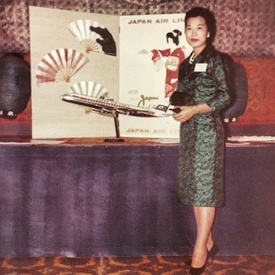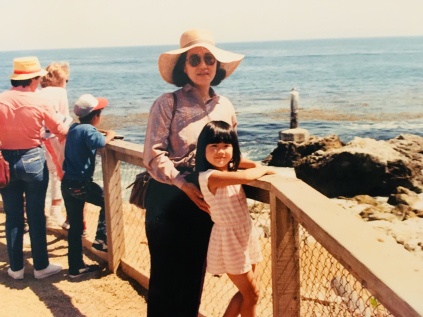Oh wow what a beautiful picture. So this is like the office?
That was our Japan Airlines office and I was taking care of the PBX board at the time. And as a senior in high school, they called us a certain name for those who were in the top category and we had to do service, and I had to do the switchboards early in the morning before the regular operator came in so that’s why I learned how to use a switch board at John Marshall high school.
Are you fluent in Japanese? Do you speak Japanese?
I do speak it but I can’t read or write it.
So how many years did you work with Japan Airlines?
I retired with them, I guess it was about almost 20 years, I think. They had an early retirement, so I took the early retirement.
Okay, so that was it for you. You got that job and you enjoyed what you were doing.
Well one thing I did was travel, huh Adina? I took Darice, Adina when she was still small. We went to New Zealand. We were going to leave her with Grandma and you cried so much so Grandma says, ‘You gotta take her with you.’
Adina: I was a very spoiled child. I was like six. Yeah anytime I was away from my mom, I just cried uncontrollably, I was that child.
You were attached.
So here we took her with us to New Zealand. I went to Australia myself. That’s right. On each vacation, I wanted to go to one place, someplace you know. At first it was to see more of Japan. So I started with the northern island Hokkaido. See what little I can see. Pretty much got to know the bears and your mommy [to Adina] named one of the bears there. They let her name a bear but I don’t know what it was.
Adina: It was like Jennifer or like some American name.
So in Hokkaido, was it like a preserve?
Yeah preserve. I don’t know if it was natural there or not but they had a place up in the mountain near Sapporo, which is the capital and up there they had the bear and the cubs. And Darice was still quite small but they asked her to name a little new cub. I forgot what she named it now.
Adina: It was like an American name.
Jennifer the baby bear. And so you were able to travel all over Japan with your job?
Well I tried to take the opportunity to learn about Japan and see Japan so I just started with Hokkaido first and then work my on [way] down from the northern part down, and you were already near Tokyo. So you landed in Haneda which was Tokyo so can stay there a few days and then you came home and stopped in Hawaii. Oh the flights all went through Hawaii. And in fact we had to stay overnight many times to make connections. Sometimes I think sometimes our flight even went through Wake Island.
And was that to refuel or was it just because the connection had to stop?
They had to stop to refuel I think is what it was, and one time I had to stay overnight there but they tried to fly over that to Hawaii directly from Haneda to Honolulu. It was a big thing then. Planes weren’t jets they were propeller, at first. And then when it became jets it just changed everything, you know, you’re bypassing Wake but you’re even bypassing Honolulu now it’s going through Anchorage and going around the other way. So I guess I got to know Japan Airlines from when it’s in its infancy.
Yes. You were with it from the beginning.
Yeah, right.
What prefecture were your parents from?
My father’s from Etajima (Hiroshima prefecture). But my mother’s Hiroshima, the city of Hiroshima and Hiroshima-ken. That’s where they dropped the atomic bomb but they were on the other side of the hill.
So they were they were okay?
Yeah, like my cousin I know, he was a midget. I don’t know what was the reason but anyway, we went to Japan to visit family and found that, gee. That was my mother’s brother’s son. So where the Kodanis lived there was an old house from long ago but there was a little mountain and on the other side was Hiroshima city and this side was a little bit country. And that’s where they lived on this side, maybe that’s why they were protected from the atomic blast or energy. But the little boy, he was only so big, you know. But found out that his mother had gone through that atomic blast. She was living on the side of Hiroshima city. So we don’t know exactly what but he was born as a small boy.
We went back to Japan after the war and visited two or three times, I guess. I took mom and pop. They didn’t want to go back but I told them they could go back on my pass. I was able to take them home. A lot of people, I think that’s one thing they did was even the employee would still stay at home but they’ll send the parents, you could use your points. But they never wanted to go back to Japan.
Why was that?
I don’t know, I don’t know why. But they didn’t necessarily want to or need to. I think his brother used to come and visit. I remember him, he was a big tall man for the Japanese but he used to visit or lived here in L.A. with my dad. In a little apartment or little places. And I guess my dad as well, I guess they all worked up north toward Modesto or some place? I guess there was a lot of farming.
Yes. Central Valley up there.
So they were working up there. And then my father became ill, something with a stomach thing and he couldn’t go to the hospital here. So he finally came home and since then he’s been never strong with his stomach, he’ll get sick easy.
Really?
And when he came home he was there in Japan for a while, and that’s where I guess he met my mother.
Okay, so they met in Japan.
They met in Japan. She was born here in Long Beach. But the father took them all back home before school started.
To have them just learn and be educated in Japan?
You couldn’t marry right or something if you didn’t have the right qualifications.
Okay so they met. Was that arranged at all?
No it wasn’t. As far as I know they were introduced by a friend, another family friend, Morioko-san. And I guess Pop liked her I guess. I don’t know, he wanted to come back to America. And he came back and left mom of course there, she was still going to school.
Adina: There was a big age difference. There was like a 15 year age difference. She was a teenager still when they met. She was very young when they met. I think my great-grandmother was 16 or 17 when my grandma was born.
Yes, she was young. The age difference was quite a bit.
So your father came back. Or did they come back together to California?
No, my father came back after he got this bad illness in his stomach, he wanted to come back so he did come back. But he was introduced to my mother in Japan. And she said it was embarrassing when she was betrothed to someone but he didn’t care to come back, she didn’t think that he would ever earn enough money to come back after her. So one day she just told her father she’s going to America and she got on the boat herself, somehow. And she came to America to look for him. And they got married actually at the place where I was born, there were so many hills around our place.
So that’s where Mrs. Marshall – I can still remember her. They lived upstairs and downstairs was vacant. So that’s where my mom and pop got married because he said they had to get a minister, he was in his gardener’s clothes that he was working in and they just got married there. So my mother used to feel so sad about when you’d see all the new weddings that we were doing and the children were having. And they had a minister come and marry them so they could live together.
And Mrs. Marshall, I guess she was awfully good to my parents because every Christmas we always went to her house, and to remember her. And I still remember the stairs though, it was funny. It was on the hillside and you had to climb up stairs to their house level. But she had a wooden stairway all the way up to her house. And we lived down the stair. And my mother was saying that Mrs. Marshall taught her how to play the piano and cook, taught her English, and did a lot of things for them.
So every Christmas we would go visit her, take some Christmas gifts and visit them. I always remember the stairs. My mother used to say I used to climb up the stairs but I never could come down. I was scared to come down, so I would be sitting up there crying. So she said she had to go and get me every time, she said she was with her second child, my brother. So she said it was it was getting to be awful. But anyway she couldn’t go up those stairs, but we moved down to Virgil. That’s when we moved down there.
She said that she used to lock the door but I’ll be gone again. I used to go and love to pick flowers, she said. I don’t remember that but I go down the driveway and go up the street on Virgil and go up to people’s backyards. And I guess I was just picking them, I was breaking all the stems, bending the flower stems and the neighbors were getting so upset but she said she couldn’t watch me. So she put a hook on the door but she said somehow I found a way to open it, so she kept putting the hook up higher and higher to the top of the door.
She was trying to keep you in.
Yeah to keep me in from always going out, running out again, or whatever work she’s doing around the house. And I guess, she’ll find a broom on the floor. I guess I found a way to knock it open. I used to sneak out again and she said she had to go look for me she’ll find one sock here, somewhere down the sidewalk she’ll follow the shoes. And she’ll find another sock somewhere else. And she said she always followed my path only because I didn’t like to wear shoes and socks for some reason.
It’s like a game between you two.
I drove my mother nuts. She said I really was too rambunctious I guess.
You kept her on her toes.
I still remember I found a broomstick to push the key way up there. I’d run, disappear again.
Your mother, she must have been tired.
Yeah it was too much for her and I guess she had a big stomach so it made it harder.
To be continued...
*This article was originally published on Tessaku.com on May 13, 2018.
© 2018 Emiko Tsuchida








